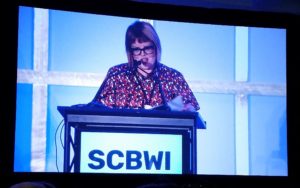I purposefully didn’t title this piece with the words “author brand” because there are important distinctions between a brand and what I’m talking about here (and calling my “author theme”), and also because I don’t want to anger Libba Bray! But let me back up for a second and give you the all-important context.
 I recently attended the SCBWI conference in L.A. where there were some amazing keynotes (and there were a whole lot of keynotes at this conference). The brilliant YA novelist Libba Bray gave her keynote on Saturday afternoon. As a conference attendee, I was buzzing with inspiration from the previous day and a half but not overloaded and exhausted like I was pretty much all of Sunday.
I recently attended the SCBWI conference in L.A. where there were some amazing keynotes (and there were a whole lot of keynotes at this conference). The brilliant YA novelist Libba Bray gave her keynote on Saturday afternoon. As a conference attendee, I was buzzing with inspiration from the previous day and a half but not overloaded and exhausted like I was pretty much all of Sunday.
Libba discussed something that is on the mind of any writer who is tuned into the business and marketing side of publishing: author branding! I’ve been trying to come up with a snappy definition of an author brand, but it’s kind of making me woozy thinking about it, so I Googled it instead. Here are the links to the first couple of articles that pop up “How To Build Your Author Brand From Scratch (And Why You Need To)” and “7 Best Ways To Build An Authentic Author Brand.”
The bottom line is that most authors feel the pressure to have a brand, but it feels icky to figure out what that is and how to create one that is effective in selling ourselves. And selling yourself is all so counterintuitive to the creative process and to being authentic to an artistic goal rather than a monetary one. Blech!
Libba articulated this phenomenon so well when she framed it as a question vs. an answer. She said that writing is about wanting to know something. This question is what makes your story come alive. The question leads us from somewhere we know to something new. The question leads to change. On the other hand, branding is advertising, and it’s all about answers. Brands are static by nature, and it puts us in a position to view kids as consumers instead of as growing, learning young humans. (No direct quotes because I tend to not worry about getting direct quotes while taking notes during conferences. Check out the SCBWI Conference Blog for a great overview of not only Libba’s keynote but the whole conference.)
Libba ended with the thought that if anyone asks about your brand, say that it’s a commitment to craft and a deep respect for my audience. This thought–and the whole keynote really–sparked an idea of what I’m all about as an author of books for young people. I’m not calling it a brand because yuck, hence the term I use in the title of this post “author theme.” Where a brand would be about selling myself or my books, my author theme is about what I think I bring to the table as a creator, writer, teacher, and human being.
I know authors who essentially say all their writings–no matter what form, genre, or intended audience–come back to some central theme or idea. I’ve always struggled to come up with any one thing that ties all my work together, never mind one thing that ties together who I am with my work. The spark that came to me during this keynote pulled together my writing, my talks about writing and the creative process, and my philosophy on life in a way that I had never been able to do.
Now that I’ve thought of it, it seems painfully obvious that this is what I’ve been writing about and thinking about. It ties in the ubiquitousness of my sister’s death with my career. It’s the thing I’ve been inscribing in ELIXIR BOUND when I sign copies for readers. (Are you screaming at the screen yet for me to just tell you already?!) Alright, alright…here it is in all it’s simple glory:
Find Your Magic.
That’s it. It’s as simple as that. My sister’s death helped me see the thing I was supposed to be doing in this world, the magic of writing for kids and teens. It’s the thing I try to bring to kids when I talk to them at book events and school visits. I know they won’t all grow up aspiring to be writers (though I always emphasize the importance of having the skills of being an effective reader and writer), but I want them all to pursue, in some way, the thing that feels like magic to them. It’s the thing my characters are always trying to find as well, their magic. And it’s kind of been there all along, staring me in the face. I was finally able to see it and grasp on to it.
Find Your Magic.
As simple as it seems, it’s not always simple to do it, to live it. You have to first figure out what your magic is, which is no easy feat. It took me 20+ years of life and a major life event to figure it out myself. Then once you do know what your magic is, you have to figure out how to pursue it while also, ya know, feeding, clothing, housing yourself and any independents.
But when you can figure out a way to actually do it (even if it’s not the way you make your living), when you actually find your magic and live your magic. Wow, that’s some pretty amazing stuff.



















